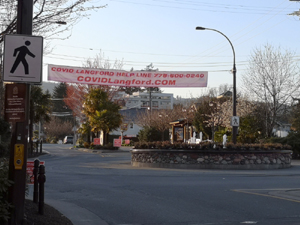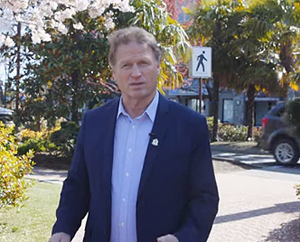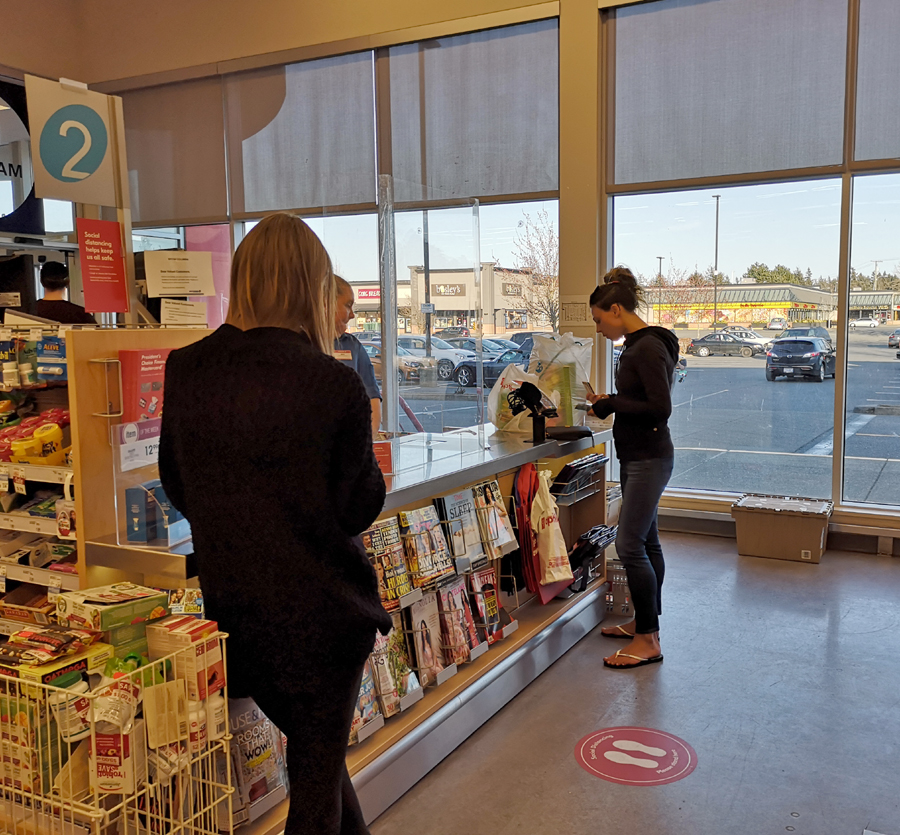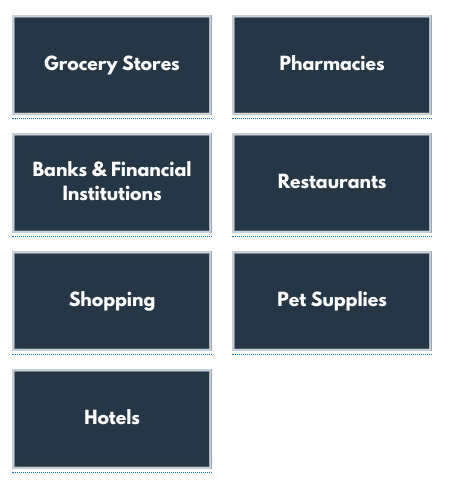
Monday April 13, 2020 ~ LANGFORD
by Mary Brooke~ West Shore Voice News
As the realities of the ‘new normal’ of living with COVID-19, things are different around Langford.
Streets are lightly traveled or even empty around much of Langford (and the Greater Victoria area) during the infectious pandemic, notably at times when there would normally be lots of traffic and pedestrians.
For all the complaints about congested vehicle traffic at normal times, during COVID-19 all of a sudden the infrastructure of roads and parking lots seems massive. Travel times around town for doing errands are now swift compared to any pre-COVID time.
As part of self-isolation and physical distancing, only essential services remain operating, based on orders of the BC Provincial Health Officer.
In terms of retail that means primarily grocery stores, pharmacies, and in some cases restaurants and coffee shops (but with take-out only). Banks (with reduced hours at some branches) and hotels are also open. And for the convenience of families with pets, some pet supply stores are also open. See list of businesses that are open in Langford during COVID-19. Some vehicle repair shops remain open around the region.
In terms of health care, which is of course an essential service (the most important essential service during a pandemic!) that of course means the hospitals are open as well as some other health services providers and clinics (many of those on an appointment-only basis).
While the Ministry of Education announced mid-March (on orders of the Provincial Health Officer) that schools would be closed for in-classroom instruction, child care in schools is being maintained for the children of essential frontline workers (like health care workers, first responders, and service industry workers in grocery, pharmacy, transport and delivery). As well, schools are continuing to provide in-classroom instruction for special needs students who would otherwise very likely fall behind in their development if they miss a chunk of the school year. Where meal programs are relied upon by some low-income families, the schools are reassigning personnel to accommodate that service as well.
Teachers across BC are now charged with providing continued learning to students to do at home. Where students need computer or Internet support for maintaining their learning at home, school districts are helping out with that. | See Opinion-Editorial as released April 13 by Education Minister Rob Fleming (link to come)

In his Easter weekend video-message online on the City of Langford website COVID-19 page, Langford Mayor Stew Young reminded people to get out and enjoy the outdoors, but to wear a mask appropriately.
“Let’s be grateful for all the hard work that our frontline workers are doing, what our community is doing, and the residents of Langford, for all the support they’re giving to everybody who needs to be helped,” says Mayor Young.
Many stores in Langford have signage or markings on the floor to help guide customers with achieving physical distancing.

Most people are careful to work their way around others in spaces that are sometimes not quite perfectly set up for adequate physical distancing between people (which should be 2 metres or 6 feet). Some spots are tricky, such as in-and-between check-out lineups in stores and in bank lobbies for use of automatic teller machines where the pause-point must nevertheless be directly passed after using the ATM in order to reach the door.
It’s important for people to adjust to the reality that sidestepping another person is not rude, it’s a courtesy. The spread of the COVID-19 virus happens within a 2-metre/6-foot proximity.
A lot of people now wear masks or gloves while doing their essential errands. Most stores are providing bags at the checkout, usually at no charge now; the use of reusable shopping bags is banned by order of the Provincial Health Officer during COVID-19. Bottle returns are not accepted during the pandemic.

The City of Langford is making physical distancing signage and plexiglass barriers for checkout areas available to local businesses at cost.
Last week the City of Langford set up and passed a few bylaws to help them enforce the application of physical distancing in public spaces, including in retail and outdoor spaces.
The plexiglass barriers are in place now in most stores to help break the spread of any potential viral spread between cashier and customer, given that the proximity at the checkout (for bagging and payment) is almost certainly to be less than 2 metres (6 feet). It does make for less of a personal experience at the checkout, but most people seem in good spirits about it all.

Wearing gloves and a mask is now good retail etiquette — for shoppers and store personnel alike — during COVID-19.
The COVID-19 virus spreads by way of moist droplets from people’s breath but can also be shed from the body (hence in both cases the recommendation for a 2-metre/6-foot distance between people).
Health officials believe that even if a person shows no symptoms of COVID-19 infection (i.e. is asymptomatic) that they can still potentially spread the virus. Wearing a mask (even a home-made one) is a courtesy to others, as the fabric will serve to catch droplets from your own mouth outward.
Public health officials say that the COVID-19 coronavirus has an incubation period of up to 14 days. Travelers returning to Canada must by order self-isolate for 14 days upon return, and in BC must complete a detailed self-isolation plan that includes *not* stopping off for groceries on the way home from the airport or land border entry point.
Carrying a supply of soapy water in your car (and clean paper towels) — for washing hands between errands — is also a good idea for health management during COVID-19.



